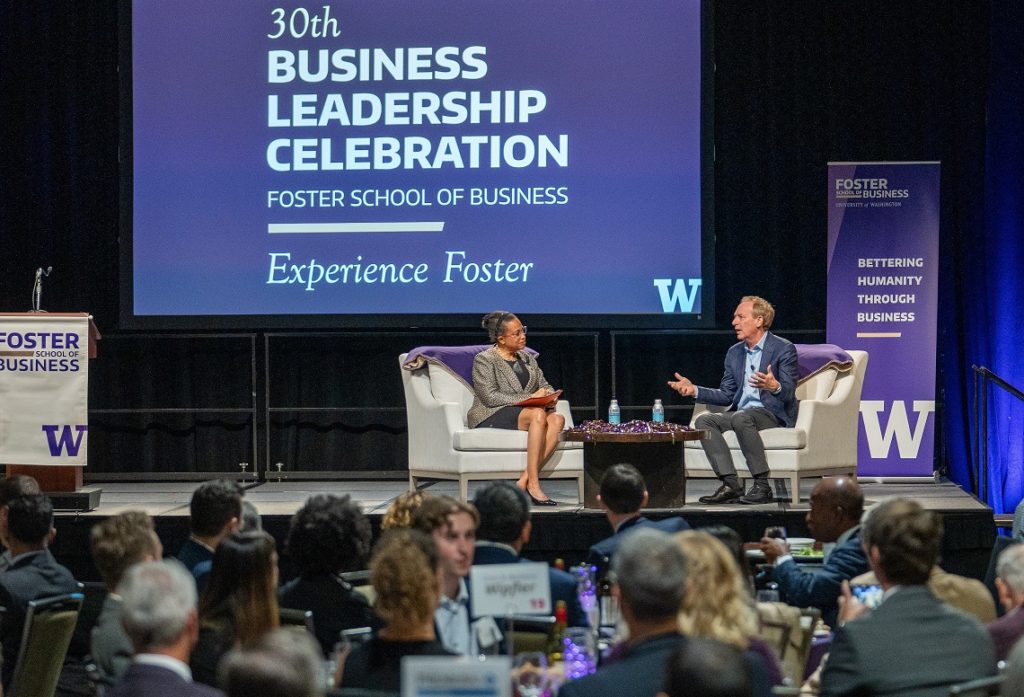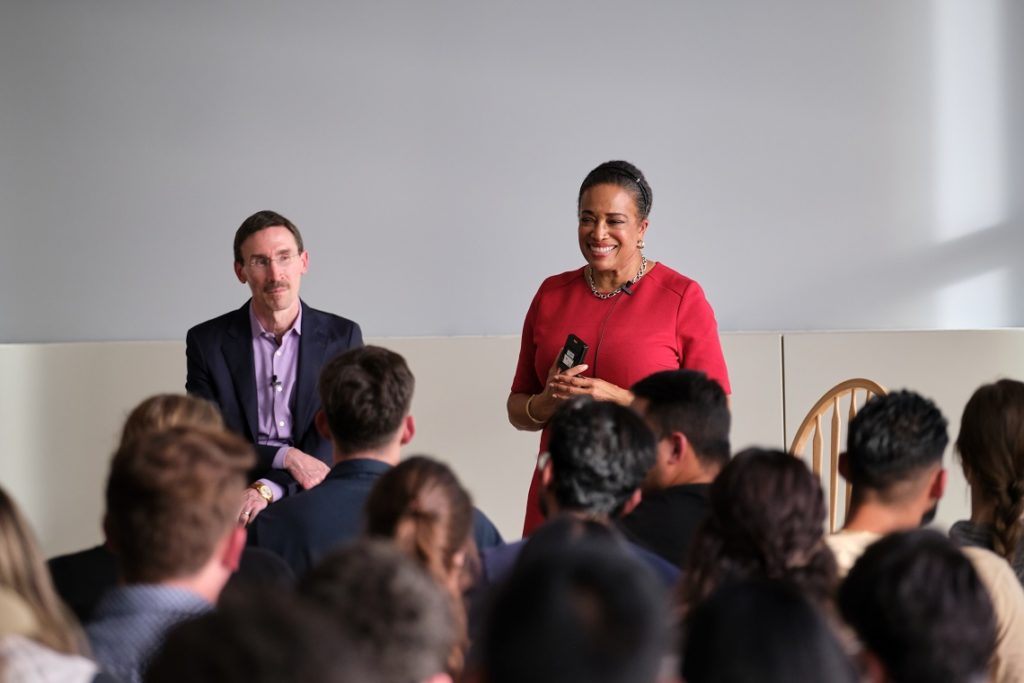Mentor-in-Chief
As Fritzky Chair in Leadership, Joanne Harrell brings vast experience and deep expertise to Foster progress
This year’s Edward V. Fritzky Visiting Chair in Leadership—Joanne Harrell (BA 1976, MBA 1979)—is a familiar face at the Foster School, the University of Washington and across the region.
A most-accomplished First Lady of Seattle (she’s married to Mayor Bruce Harrell), Harrell brings to Foster vast experience and deep expertise, plus a record of creating public-private partnerships that create innovative solutions to urgent civic and societal issues.
After a successful career in telecommunications, Harrell served as president and CEO of United Way of King County before joining Microsoft. Over two decades at the tech giant, she led teams in sales, marketing and services focused on enterprise, public sector and original equipment manufacturing customers and partners.
Harrell currently serves on the board of directors of HomeStreet Bank and HomeStreet, Inc, where she chairs the nominating & governance committee. She also chairs the board of directors at Equal Opportunity Schools and is a member of the Fred Hutch board of directors.
As a UW Regent from 2009 to 2022, Harrell served on the finance & facilities committee and chaired the academic and student affairs committees. She was the lead founding Regent for the diversity, equity and inclusion advisory committee, and remains an active member of the board’s real estate and legislative affairs committees.
Harrell was inducted into the UW School of Communication “Hall of Fame” in 2009, and was the school’s 2013 Distinguished Alumna. In May 2017, Joanne and Bruce Harrell were co-recipients of the UW’s Charles E. Odegaard Award for Outstanding Community Service and Diversity on behalf of the citizens of the state of Washington. This year, Harrell received the Foster School’s Spratlen Legacy Award.
Here are excerpts with her conversation with Andrew Krueger, senior director of alumni and media engagement at the Foster School.
Andrew Krueger: Given all of the existing commitments and opportunities you are presented with, why did the Fritzky Chair in Leadership appeal to you?
Joanne Harrell: One, I love the UW. Another reason is that I have huge appreciation for the education that I received at the Foster School. It has been pivotal in my success throughout my career.

Also, there are a number of people at the Foster School with whom I feel a sense of connection. (Dean Emeritus) Bill Bradford, for instance, I have known since he came to Foster. Although he has passed, Thaddeus Spratlen is still close to my heart. Michael Verchot is another. The work he is leading at the Consulting and Business Development Center is so important! Dean Hodge is also high on my list of Foster folks.
Finally, I love working with the students and appreciate this opportunity to partner with them.
What role has mentorship played in your life, and who are some of those folks that you credit with being your mentors?
Honestly, my first mentors were the people that I grew up with all around me. I was blessed with having had a great set of role models in my home and family environment.
From there, moving to the corporate world, I had a number of particularly good bosses and corporate leaders as mentors. Andy Smith, who was the president of Pacific Northwest Bell, was just outstanding.
When I was in the non‑profit world, leading United Way, Jeff Brotman, the founder of Costco, was instrumental. Then at Microsoft, there were a number of folks including Steve Ballmer, who was a key sponsor.
I think the best relationships—between mentors and mentees—are bidirectional and mutually beneficial. These types of connections have more energy and higher impact for both parties.
I mention sponsorship because I have found that sponsorship is equally impactful. It is important for leaders to pay attention to and connect with young, up-and-coming talent to support their growth and career development.
Do you find that you learn as much from the people that you are mentoring or sponsoring as they do from you?
Yes. I think the best relationships—between mentors and mentees—are bidirectional and mutually beneficial. These types of connections have more energy and higher impact for both parties.
Internships play a big role for business school students. Did you have a memorable experience?
I worked for Pacific Northwest Bell during the summer between my years as a Full-time MBA student. Following the summer, I was asked to stay with them into the school year.
They designed projects that I could do on my time schedule, where I could pick up the content and we would agree on a delivery date and check‑in dates. This was a long time ago. It is amazing how flexible they were. This example of partnering with employees and focusing on results in win-win ways has stayed with me.
I look at the work world now, where many people want to work remotely. I was fortunate to have the option early in my career and now I have a flexible attitude with employees who report to me. It works well if you can get clear about the deliverables and metrics. Trust and verify works well for both parties here.
At the beginning of 2020, Dean Frank Hodge named our first associate dean for inclusion and diversity and introduced Foster’s ID (inclusion and diversity) Program. From what you’ve experienced, are we heading in the right direction?
Oh my goodness, yes! I admire Dean Hodge’s open, reflective approach. In working with him over the past six months, I have seen a leader who tries to hear all voices and makes thoughtful decisions.

Throughout Foster, there seems to be a culture of being open, inclusive, non‑judgmental, and listening to understand. When I look at the oars that are in the water, it feels like Foster is on the right course.
I feel appreciated and respected for what I bring to the school. For all of us, that’s really what inclusiveness comes down to: Do we feel valued, appreciated, and respected? I feel this here and it feels good.
STEM degrees get most of the attention in discussions about higher education these days. Does business deserve more attention?
People tend to forget that many elements of business are very STEM-related.
The best business thinkers understand the qualitative and the quantitative elements of issues and can put these together in ways to facilitate creation, interpretation and leverage of human systems.
Some of the strongest leaders I have worked alongside are people who have a natural science background and then realize they want to focus on and understand business. On the other hand, I have also known liberal arts majors who have become great business leaders. My sense is that the best leaders are multi-dimensional and capable of leveraging natural systems across multiple scenarios.
The beauty of business is that you can come from the left or you can come from the right and you can put it in the middle and it all comes together just fine.
